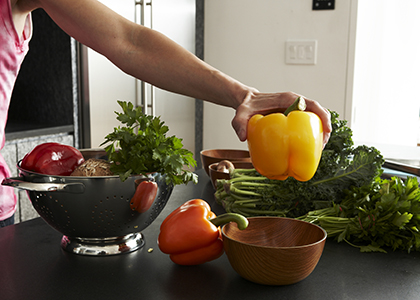
Best Tips for Storing Fruits and Vegetables
By Stacy Kennedy, MPH, RD, CSO, LDN; Reboot Nutritionist
Does this ever happen to you? You take the time to review healthy recipes, make a shopping list, get to the store, put everything away and then all of a sudden the week has flown by and your gorgeous, expensive, organic produce has wilted into a mushy brown mess? Nothing more discouraging for healthy eating than the frustration of waste. The good news is that this doesn’t have to keep happening, you can follow these simple tips and tricks to keep your veggies alive and well for much longer.
Fresh IS Best
Start off on the right foot by purchasing the ripest, freshest produce. That means hitting up your local farmer’s market. Most veggies and fruits are picked that morning and haven’t been overly handled, factory washed or ripened. You can tell by how dirty it is, and that’s a good thing! Not only does freshly picked mean higher levels of nutrients, it’s also more likely to last longer. Here’s more on Why We Love Farmer’s Markets.
Produce that Sits Together, Ripens Together
Want to prevent your apples or potatoes from becoming brown and mealy too fast? Keep them away from your onions and bananas! While these are all best stored on the counter, they certainly shouldn’t be stored together. That’s because ethylene, the “fruit ripening gas,” is naturally emitted to help ripen fruit including those surrounding them.
Fruits that are bruised, damaged or kept in plastic will also ripen faster, usually too fast. For more on why passing on plastic is the way to go, read here.
Tips to Ripen Faster
Want those avocadoes now? Um, the answer is always yes!! Here are tips for how to help your produce ripen more quickly.
- Store hard, unripe avocado in a brown paper bag on the counter.
- Keep high ethylene fruits near each other. These include, avocado, peaches, apples, cantaloupe, honeydew, banana, tomato, pears and plums.
Tips to Slow Ripening
- Wait to wash most fruits and veggies until you’re ready to use them, like broccoli, berries and beets.
- Cut the greens or stems off of beets and store in an open container covered with a damp towel in the fridge. Save greens from those beets! Wash, then store in a bag with a damp paper towel.
- Eat your fresh corn asap. Generally, 2 days max in the fridge. And no need to boil local, fresh corn. Just peel and eat!
In or Out?
Many fruits and veggies last longer on the counter while others will perish if left out of the fridge. Here’s a quick guide based on location for storage. For more vegetable-specific storage guidelines, visit Fruits and Veggies, More Matters, type the veggie-in-question right into the search field!
In the Fridge:
- Ripe fruits you want to keep fresh longer
- Cut up fruits or veggies – try to store in glass or BPA free plastic containers.
- Root veggies including carrots, beets, radishes, parsnips, turnips. Fun tip: Trim the greens off before storing, they tend to pull the moisture from the root causing them to wilt prematurely.
- Leafy greens and herbs – wash and pat dry (or use a salad spinner), then wrap in a damp paper towel and refrigerate in an open-ended bag.
- Berries and mushrooms – keep inside their purchase package or pint container.
- Eggplant — keep inside a paper bag to slow ripening.
- Most other vegetables can be kept in bags or in the vegetable drawer/crisper, including: broccoli, bell peppers, cucumbers, fennel, scallions, cauliflower, celery, brussels sprouts, summer squashes and ginger.
Out of the Fridge, On the Counter:
Keep out of the fridge in a cool, dry space, out of direct sunlight.
- Tomatoes
- All potatoes
- Winter squashes
- Onions
- Garlic
- Bananas
- Stone Fruits (peaches, plums)
- Whole pineapple and melons
- Apples that are not too ripe
- Citrus fruits (lemon, lime, orange) – put in fridge to slow ripening.
- Avocado – store in paper bag to quicken ripening or add in fridge to slow it
Here are more storage tips detailed by fruit and veggie.
Don’t Forget About Frozen
Frozen veggies stay good much longer than fresh and are a perfect back-up to have on hand for those busy weeknight dinners. Plus, in the off season, frozen can even be more nutritious than fresh.